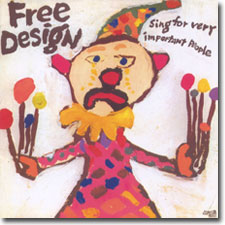Free Design
- title
Sing For Very Important People
- label
Light in the Attic
- format
- CD
 By the time of their 5th album, The Free Design were plugging away with nary a hit under their belts, but with some super fine albums they could be proud of, since they were consistently releasing the cream of the crop when it came to the sunshine pop.
By the time of their 5th album, The Free Design were plugging away with nary a hit under their belts, but with some super fine albums they could be proud of, since they were consistently releasing the cream of the crop when it came to the sunshine pop.
In 1970, the group were inspired by the children's album Peter, Paul and Mommy released by Peter, Paul & Mary in 1969, and the fact that the Dedricks were themselves parents, which led the group to release the children's album Free Design Sing for Very Important People. Light in the Attic has done a fine job remastering this album, with some bonus material, as they have done with all of the Free Design albums.
To put the album together in 1970, the group recorded a handful of originals, and coupled it with some covers and some previously released material from some earlier albums that seemed geared for children to begin with. What makes this a unique children's album, is the fact that it actually is a fairly typical Free Design album. This means it's actually quite listenable by adults who already love the Free Design sound.
There isn't anything particularly child-like about the music itself beyond the sunshine pop factor that's always been there. The Free Design lyrical content was always innocent and child-like from the beginning and well suited for an album dedicated to that feeling. The only difference from their earlier albums may be a more subtle one, in that their sometimes is less instrumentation overall and a simpler approach. But there isn't the usual Puff the Magic Dragon covers or children singing on this album we've come to expect from children's music. In fact, everything here makes an interesting point - from the title to the abstract child-like art on the album cover - that children aren't to be ignored because they are children - that they are important people, too.
The Free Design penned a handful of originals for this album including:
- Don't Cry Baby - the album opening track, which shows the simpler arrangement style the group would use on their newer tunes for this album - simple piano and a singer/songwriter style of songwriting is explored on this gem that combines a Carpenters' ethos with a classic girl group styled lyric to come up with a lullaby like melody.
- Love You - is even simpler, mostly a cappella, with multi-tracked vocal harmonies and some recorder, and lyrics like "I love forget-me-nots, fluffernutters, sugarpops" which somehow evokes childhood, yet shows a nostalgic take on it.
- Ronda Go' Round - is a funky take on the vocal style Free Design have honed to perfection, and it really kicks in near its conclusion.
- Lullaby - the album closing track is a sweet lullaby of a tune, again sung a cappella for a perfect ending.
Free Design also delved into a handful of covers to augment their self-penned tunes including a Free Design favorite in Can You Tell Me How To Get To Sesame Street? which was very popular in 1970, and was included on the Raindrops compilation. Little Cowboy was actually written by Art Dedrick, the group's father, and is a hidden favorite on this album which was also included on the Siesta compilation, Raindrops. Rounding out the covers are Children's Waltz and Scarlet Tree with Scarlet Tree coming out a bit more interesting with the mesmerizing vocal harmonies and piano led melody.
To round out the album are songs recompiled from previous albums, including the best track on the album, Bubbles (from the 1970 album Stars/Time/Bubbles/Love, and compiled on many of their compilations, and also covered by Dressy Bessy on the Powerpuff Girls soundtrack), Daniel Dolphin (from 1968's You Could Be Born Again), and of course the fan favorite Kites Are Fun (from their 1967 debut album of the same name). It's a shame these songs weren't re-recorded in the simpler style the Free Design employed on the other tracks recorded for this album.
Light in the Attic has also added two outtakes from Chap Stick commercials called For The Love of Your Lips, which show Free Design making ends meet doing vocal jingle work as did many artists at that time.